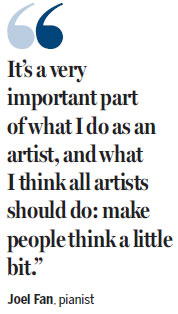
The Kennedy Center in Washington has heard many classics, but this summer pianist Joel Fan brought here something new.
His performance in June, entitled "From China with Love: Connecting Cultures through Music", included both Chinese favorites like Liuyang River and Castle in the Sky and complex Western classics, all intended to give audiences from different cultures something unexpected.
"As a musician, you really are like an ambassador for cultural exchange," Fan said.
"I'm sure this is the first time some of these pieces have been performed at the Kennedy Center. And yet it's still music, so it still has a sense of logic, a reason, a story to it. So I think it really communicated with the audience," Fan said, waving his phone to show he was already getting emails of appreciation from fans.
Fan said he was inspired to create the program while he was touring extensively in China over the past three years. On his last tour over the winter he covered 20 Chinese cities in two months. That's when he decided to design a program that would "stretch the ears" of the audience.
"I hope to have stimulated them both emotionally, and intellectually," he explained.
He believes his program gives the audience an experience to remember, while trying to bridge cultures.
"I hope it's educational," he added. "It's a very important part of what I do as an artist, and what I think all artists should do: make people think a little bit."
Fan put a lot of thought into designing the repertoire. "To stretch the ears, the program design is very important, the flow of the pieces. It's like being a DJ. You have to select the right tracks," he said.
The audience, the venue, the length, as well as the sequence of pieces - all mattered.
Born in New York to a family with Taiwanese roots, Fan started playing the piano as a child, following his parents' wishes. He first played with the New York Philharmonic at age 11. It wasn't until later that he found he had true passion and talent in playing the piano, and decided to pursue this interest, going on to study at Juilliard, Harvard and the Peabody Conservatory.
"When you're five years old, the challenge is just putting your fingers in the right place. But that's just the starting point, the tip of the iceberg. A robot can do that," Fan said.
"That's different from making music, and making music is about telling stories, creating psychological drama, grabbing the audience and telling the story from beginning to end."
Fan said he still remembers how fascinated he was with the piano and Avery Fisher Hall as a child.
"I look at the piano now, it's the same piano. So one very important thing for me is how it's been this connecting part of my life: I can be in a different city, different country, but the piano is always the same," said Fan.
Fan believes that for an artist, learning is a life-long process and that is what makes being a pianist still compelling after so many years.
"To grow as an artist you have to learn so many things," he said. "A lot of it is intuition and talent, but also a lot of it has to be learnt, the way an actor learns how to act or a painter learns how to paint. You have to learn how to master psychology and storytelling."
Being a performing artist is not just about following the composer's blueprints and conveying his own emotions and interpretation, he said. Another important part of the artist's role is learning to adjust to different halls and venues.
"Before every concert you do a sound check to see how the piano sounds in the hall. Every hall is different. It's almost like you have to solve a puzzle every time," he said. "This is where experience really helps."
While he was building his career in the US, Fan did not feel any bias towards him because he was Asian, in fact he felt a lot of support and acceptance for Asian artists in the world of classical music.
"If I was a rapper, or if I was going to be like Taylor Swift, that's a different story," he joked.
Fan was a member of Chinese-American cellist Yo-Yo Ma's Silk Road Ensemble, a project that gathered performers and composers from more than 20 countries.

"It was such an innovative group it was mind-bending," Fan said. Having been trained in the Western style, his work with the Silk Road Ensemble made him look at music through a totally new lens.
"It's still music, but the aesthetics, the sound, the values are different, the psychology is different. It's almost like putting people into a trance and reaching a higher level of enlightenment."
Fan has been playing a lot in China in recent years.
"It's just so good to go to China, where they have those halls and that huge demand for classical music. It's wonderful to perform in that environment," Fan said.
"It's interesting, the Chinese perception of me. Because obviously I look Chinese, and I have a Chinese name, yet I'm from America and I live in New York," Fan said.
Fan said he likes to do master classes when he tours.
"I think music education for young people is a really important role of an artist," he said.
"It's really important to inspire those with talent to make the most of what is given to them."
Liu Jingyang in Washington contributed to this story.

|
Jeol Fan was described as "impressive pianist" by The New York Times. Provided to China Daily |